
God rest ye merry, gentlemen!


God rest ye merry, gentlemen!
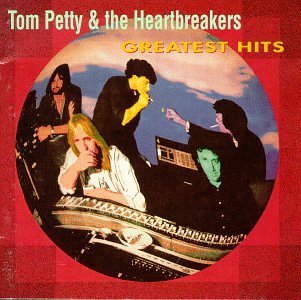
The First Album That Anthologized Tom Petty & The Heartbreakers' Work, "Greatest Hits" (1993) Will Always Remain An Excellent Introduction To Their Music On The Whole. One Of The "New" Tracks ("Mary Jane's Last Dance") Was To Became A True Staple In Its Own Right.
Tom Petty’s very first retrospective, “Greatest Hits” (1993) would become one of his best-selling albums ever. It included all the seminal tracks he recorded both with the Heartbreakers and as a solo artist. These include “American Girl” and “Breakdown” from the debut, the four best tracks from the breakthrough album “Damn The Torpedoes” (Refugee”, “Here Comes My Girl”, “Even The Losers” and the ultra-successful “Don’t Do Me Like That” – is it me, or it has been slightly remixed?) and the sole hit from “Southern Accents”, “Don’t Come Around Here No More”. It also has two of his best ‘80s tracks in the shape of “The Waiting” and the synth-soaked “You Got Lucky”.
Finally, “Learning To Fly” and “Into The Great Wide Open” come from “Into The Great Wide Open” (1991) and the three best cuts from Petty’s only solo album up to that point (“Full Moon Fever”, 1989) are featured (“I Won’t Back Down”, “Running Down A Dream” and the dizzying “Free Falling”). Continue reading

"Echo" (1999) Was The First Album That Tom Petty Issued With The Heartbreakers In 8 Years. On The Album, Petty Coped With The Passing Of Some Dear Friends And His Very Own Divorce.
As you know, I am not the biggest fan of “Wildflowers“, Tom Petty’s second solo album. I have always felt that he could only take the pastoral element so far, and that the rockers were jaded. That album did, however, set the scene for one of his finest works with the Heartbreakers, 1999’s “Echo”, an album that was to sound like the truest solo offering of his whole career – yes, even more than “Full Moon Fever“, “Wildflowers” and the forthcoming “Highway Companion”. If anything, that “solo” feel was the indirect result of the passing of some of his friends, and the direct consequence of his own divorce.
I feel I must mention that “Echo” was not the first album that Petty released with the Heartbreakers after “Wildflowers“. He did actually bring the boys around for a soundtrack album that certainly renewed their energies. That was the “She’s The One” OST, and while I did never consider it a canonical album (and I actually actively dislike it) I’m the first to admit it did energize the band. Because cuts like “Won’t Last Long” and “About To Give Out” on “Echo” could never have sounded as fresh as they did without that soundtrack, nor songs like “Accused Of Love” and “This One’s For Me” sound so joyous and frolicsome.
Still, “Echo” will always be remembered for the catharsis of songs like “Room At The Top” (where the nature and the inexorable downfall of forced forgetfulness are explored), and the two final tracks, “Rhino Skin” and “One More Day, One More Night”. “Rhino Skin” is a cry of disgustingness at the cruelty of life, and “One More Day, One More Night” is a song of resignation in which I like to read between the lines and find a certain determination to carry on. It’s placement on the album is certainly impeccable, especially when we pitch it against the opening “Room At The Top”. That is something about the album: how well structured it is. Songs which are not that pivotal like “Swinging” and Mike Campbell’s “I Don’t Wanna Fight” (in which he also happens to take the lead) don’t get in the way at all. And the title track (one of the most Dylanesque compositions that Petty ever penned) is placed right in the middle. The song (which is absolutely gorgeous) is too long to be either at the beginning or at the end. It could only work there, especially as the track that follows it is “Won’t Last Long”, a song which is pure make-believe, and which is what the album needs after the expurgation of its title track.
The cuts that deal with Petty’s separation more forthrightly are situated mostly at the beginning, and they are not really my favorite songs on the album. They include “Free Girl Now” and “Lonesome Sundown”, and while I have never thought too much of either I have to admit that “Free Girl Now” has Petty sounding as pissed as he ever did. What is interesting is how well he controls and channels that anger (something he could not do on the next album, “The Last DJ”). That ability to take negativity and turn it into something that could instill positive action on the listener is what wins me over in the end. Despite the circumstances that surrounded it, “Echo” managed to sound victorious instead of vanquished. And along with “Into The Great Wide Open” and “Full Moon Fever“, this is the one album of Petty I reach out for the most often.
Rating: 9.5/10
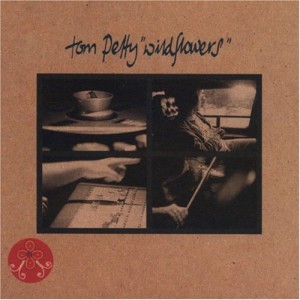
Tom Petty's Second Solo Album, "Wildflowers" (1994) Was Produced By Rick Rubin, With Michael Kamen Adding Many Orchestrations.
Tom Petty’s second solo album is clearly a more modest effort than his previous solo offering (“Full Moon Fever“, issued in 1989). This time around there are no superstars backing Mr. Integrity (fellow Traveling Wilburys Roy Orbison, Jeff Lynne and George Harrison had contributed substantially to the making of “Full Moon Fever”), and “Wildflowers” was to end up sandwiched between two of Tom Petty & The Heartbreakers better releases: “Into The Great Wide Open” (1991) and the tragedy-inspired “Echo” (1999). If anything, “Wildflowers” seems to me a canvass upon which “Echo” was to be painted. In some cases, a couple of brushes have already been either insinuated or put into place in “Wildflowers” – the songs “Crawling Back To You” and “Don’t Fade On Me” constitute a true link in the chain of despondency and abatement that would come to define the most endemic material to “Echo” (“Rhino Skin”, “One More Day, One More Night”).
By my reckoning, there are only a handful of tracks here that are real keepers. These include “Time To Move On” and “A Better Place”, both reasonably upbeat (or at the very least positive) compositions, and the relatively loud “Honey Bee”, a number in which Tom and Mike Campbell have one of their best guitar duels on record with the instrument of each having a separate speaker all to itself.
The three-chord rocker “You Wreck Me” was a successful single, and so was the mellow, autobiographical “It’s Good To Be King” . I think they are good, but not that good. I wouldn’t call “You Wreck Me” rote, but I would call it perfunctory. And when I listen to “It’s Good To Be King” I get the feeling Petty is holding something back – something he would unleash to good effect on “Echo”, and to disastrous consequences on “The Last DJ”. In the end, Michael Kamen’s orchestral arrangement is what makes this rumination on fame remotely memorable.
The folksy contingent of the album is best-represented by the title track, which is a lovely air and one of Petty’s most realized incursions in the genre. Conversely, cuts like “To Find A Friend” are easy to listen to, but also easy to be forgotten. Continue reading
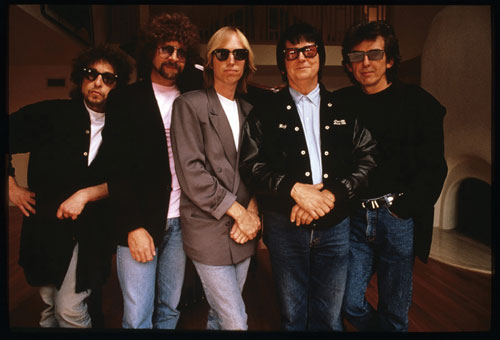
The Traveling Wilburys: Bob Dylan, Jeff Lynne, Tom Petty, Roy Orbison & George Harrison
I have been asked a couple of times already who sings exactly what on the two volumes that The Traveling Wilburys were to issue during their stint together. Some (younger) people just aren’t accustomed to the singers’ voices on their own, and that is aggravated by the fact Petty sounds just like Dylan more than sporadically (“End Of The Line”, “7 Deadly Sins”). That is the reason why I decided to put this list together.
To begin with, their pseudonyms for each album:
Nelson Wilbury – George Harrison
Otis Wilbury – Jeff Lynne
Lefty Wilbury – Roy Orbison
Charlie T. Wilbury Jr. – Tom Petty
Lucky Wilbury – Bob Dylan
Spike Wilbury – George Harrison
Clayton Wilbury – Jeff Lynne
Muddy Wilbury – Tom Petty
Boo Wilbury – Bob Dylan
Now, who sings what:
Handle With Care – Harrison
Dirty World – Dylan
Rattled – Lynne
Last Night – Petty
Not Alone Anymore – Orbison
Congratulations – Dylan
Heading for the Light – Harrison
Margarita – Dylan
Tweeter and the Monkey Man- Dylan
End of the Line- Petty (with Harrison, Lynne and Orbison singing a verse or two each) Continue reading
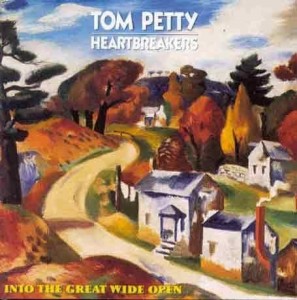
"Into The Great Wide Open" Was The Final Record Tom Petty & The Heartbreakers Cut For MCA. Jeff Lynne Produced It.
Some albums can have a very limited tonal palette and still manage to convey emotions with such vividness and diversity that you can but be amazed at the level of craftsmanship displayed by their composers. “Into The Great Wide Open” is an album that certainly brings that to mind. Produced by Jeff Lynne, it was Tom Petty & The Heartbreakers eight album overall, and the last they would release for MCA Records.
The year was 1991, and the partnership with Lynne made a lot of sense – not only did Tom and Jeff get along like a house on fire, Lynne had helmed the praiseworthy “Full Moon Fever” just three years before.
In terms of sound, “Into The Great Wide Open” recalls not only Petty’s first solo album but also The Traveling Wilburys’ entire oeuvre with its mix of contemporary motifs and a shiny roots rock feel. That was an inevitable point of comparison, and one of the main criticisms leveled at the album – that it was nothing but “Full Moon Fever 2”,and that the production undermined the message.
The first part of that argument did hold its own, and Petty knew as much (this was the last album Lynne produced for him). But I find the second part patently untrue. Petty did never touch upon his endemic themes with such accuracy, vitality and grace.
The first single was to top the Mainstream Rock Charts for six weeks. Named “Learning To Fly”, it has become one of Petty’s trademark songs, and the one song of his that everybody knows down where I live (Uruguay). That is a good thing – the song is one of the catchiest within his repertoire. And thematically, it has all the basic ingredients that Petty is known to combine at his most emblematic- a lyric where hopelessness is turned in its head by the mere resolution of the protagonist to hold onto something that he actually knows is not there. But it will be there one day. Until that day comes, it is a matter of going up and down.
And several songs showcase a development in Petty’s typical cast of characters that one can help but feel, “At last, it all comes full circle”. I am speaking about “King’s Highway”, where the promise of a better day becomes engraved in time by the courage of the narrator to believe the force of his will. And the song “Two Gunslingers” has two gunfighters (IE, two slaves to a brutal form of entertainment) breaking out of their given roles, with one of them pronouncing “I’m takin’ control of my life” so many times that what ends up mattering is the life that is begotten, and not the onslaught that we (as the listeners) know had preceded that moment. Continue reading
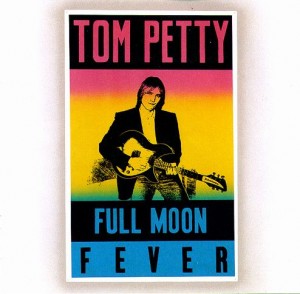
"Full Moon Fever" Was Tom Petty's Solo Debut. It Came Out In 1989, And It Yielded Three Hit Singles.
An immensely accomplished record, “Full Moon Fever” was Tom Petty’s first solo album. It was released in 1989, right after The Traveling Wilburys’ beloved debut. Jeff Lynne was to helm Petty’s record, and both Harrison and Orbison would lend their talents too. That was the reason many pronounced “Full Moon Fever” the “true” continuation to “The Traveling Wilburys Vol. 1”, and they also took the fact the next recording issued by the Wilburys was called Volume 3 at face value.
Well, that is always something which could (and will) be disputed and counter-disputed till the rivers all run dry. But everybody will always agree on something: Petty came up with a wondrous record from start to finish.
Five tracks were released as singles, and three of them have become staples of classic rock stations: “Free Fallin’”, “I Won’t Back Down” and “Runnin’ Down A Dream”. “Free Fallin’” is a dexterous study on growing up, with somehow childish verses at the beginning that eventually give way to a sudden, mature conclusion in a way that is beautifully startling.
On the other hand, “I Won’t back Down” is as cocky as its tile suggests, and it is the one cut to which George Harrison added backing vocals. The song was to be covered by Johnny Cash for his third American album, “Solitary Man”.
Finally, “Runnin’ Down A Dream” rocks and swings in equal measures, showcasing Petty’s influences in a distinct way. “Runnin’ Down A Dream” references Del Shannon in the first verse, and the song that is mentioned (“Runaway”) was actually covered by The Traveling Wilburys. It is now found on every remastered edition of the “The Traveling Wilburys – Vol. 3”. “Runnin’ Down A Dream” was written by Tom Petty and Jeff Lynne along with Mike Campbell. Campbell also got together with Petty to compose “Love Is A Long Road”, a song that fully recalls the sound of Petty’s combo. Yet, the production by Lynne gives it a sheen of its own, and the song was rightfully issued as a single. Continue reading
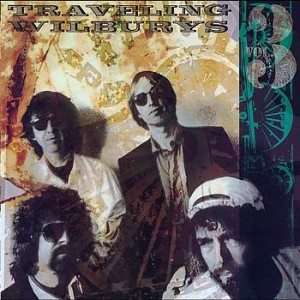
"The Traveling Wilburys Vol. 3" Was To Be The Final Release By The '80s Supergroup
The second (and final) record by the Traveling Wilburys surfaced in 1990, and it was to be titled “Vol. 3”. This is widely thought to be a joke suggested by George Harrison (who was the unofficial leader of the band) to send fans scrambling for an album that never was. We know he did suggest the title, but I believe that it was a two-fingered salute to bootleggers rather than a joke – the amount of “unofficial” Wilburys records that came out after the first volume was unbelievable. And many also consider Tom Petty’s first solo disc (“Full Moon Fever”) to be the “lost” Wilburys album – it was produced by Lynne, and every Wilbury (except for Dylan) collaborated, albeit marginally in most cases.
The fact remains that after a universally-praised record that rejuvenated everybody, this new volume was released. The main difference telling one record from the other? The first time around, the guys were having fun. Now, they were getting down to business. The joviality was somehow missing the second time around. The professionalism remained, and so did the camaraderie. But not the lovable goofiness.
The passing of Roy Orbison surely had a big impact on the band, and the fact that both Dylan and Harrison penned songs that were truer to their ‘80s selves rather than genuine Wilbury music was the tipping point. Songs like “Where Were You Last Night” (Dylan) and “You Took My Breath Away” (Harrison) pointed to each artist’s worst tendencies during the previous decade. And the one joke of the disc was incredibly forced – “Wilbury Twist” had rampant instrumentation but they were trying too hard to revive something that the first time around flowed so effortlessly.
Speaking of rampant volume, the album’s first single (and its first track) was the heavy “She’s My Baby”, a song that always makes me think of Pete Townshend’s “My Baby Gives It Away”, only that the characters in the Wilbury’s song are far, far meaner and darker. The track (which did very well in the charts) also featured Gary Moore on guitar – he definitively had a field day. Continue reading
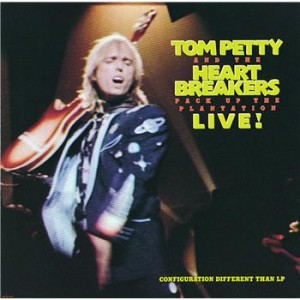
“Pack Up The Plantation” Was The First Live Album Ever By Tom Petty & The Heartbreakers. It Came Out In 1986.
“Southern Accents” proved so contentious that less than one year after its release Petty and The Heartbreakers issued their first live album, as if they were to exorcise the previous offering from their systems and prove to fans and critics alike that they could still rock like they meant it.
The album was to be named “Pack Up The Plantation”, and many different configurations exist. To begin with, we have the original LP/Cassette release that was accompanied by a live VHS in which some songs were added, all of them good (specially “Don’t Do Me Like That” from “Damn The Torpedoes” and “Don’t Come Around Here No More” from the previous record). The original album (which was a double LP) was repackaged as a single CD that had a different running order and which dropped two tracks: “You Got Lucky” (a great loss) and “I Need To Know”.
Still, the album in any incarnation is a lot of fun. The “Southern Accents” contingent feels more endemic to the band thanks to the rawness that any live setting provides, and “Rebels” in particular is a showstopper.
As it is the case with live albums, some songs have different arrangements – the most noticeable is “The Waiting”, rendered solitarily by Tom until the band thunders in during the middle eight. Elsewhere, “Breakdown” is stretched quite a bit, and the part where Petty starts an adlib that degenerates into an almost babble is amusing, even when it doesn’t precisely make the song any better. Continue reading
Click here to read the introduction to this review.
“Southern Accents” was an album that generated a considerable amount of friction within Tom Petty’s camp, to the point of physical violence – Petty broke his hand after punching the wall during the recording of the opening track, “Rebels”. The song and the track that follows (“It Ain’t Nothin’ To Me”) toy with those stereotypes that I mentioned in part 1 of the review, and I wouldn’t be surprised if some Southerners would shoot up copies of the record while “The Night They Drove Old Dixie Down” plays in the background.
Leaving the subject matter aside (basically “people down South are good-for-nothing louts, they can only raise hell”), the songs are good. “Rebels” is an infectious rocker (even if the production is a bit distracting), and “It Ain’t Nothin’ To Me” is a funky cut showcasing that Petty was in a willfully experimental mood. Well, he had someone that was more seasoned in that to assist him – the song was cowritten with Dave Stewart (better known from his work with Eurythmics), as was the other major curve ball on the disc: the hit “Don’t Come Around Here No More”. It is important to mention that the song had actually been offered for “Long After Dark”. That also gives you a clear indication that the conceptual thread on “Southern Accents” sometimes disappears altogether, in no small part thanks to the disagreements that recording a “concept” caused among Petty and his unit. They were known as rockers, after all. “Southern Accents” was a more polished and (above all) more diverse album. It was also an expensive record, and they labored at it for longer than any of them felt comfortable with at the end. Nowhere is that clearer than on the video for “Don’t Come Around Here No More”. A far, far cry from flagship tunes like “American Girl” and “Refugee”. They only rock at the end, the rest is all the things you can imagine but a rock & roll tune:
The first side finalizes with the title track. I first listened to Johnny Cash’s take on the “Unchained” disc (American II), and it absolutely had me first time around. It is the one “concept” song I deem as respectful and moving, and the lyrics are something which most people can sympathize with it, no matter where they are. But being a Southerner myself I found it so compelling that I bought this album after having listened to Cash’s version just once. As far as Petty and the Heartbreakers’s version goes, I consider it Benmont Tench’s most realized moment with the band. Continue reading